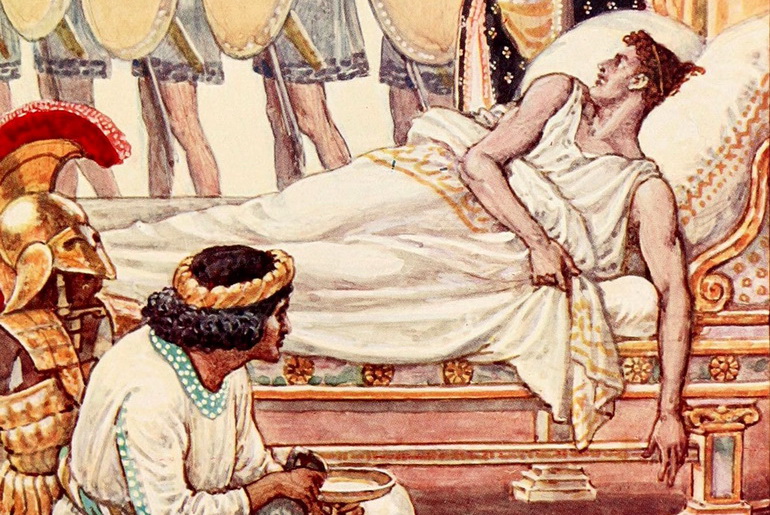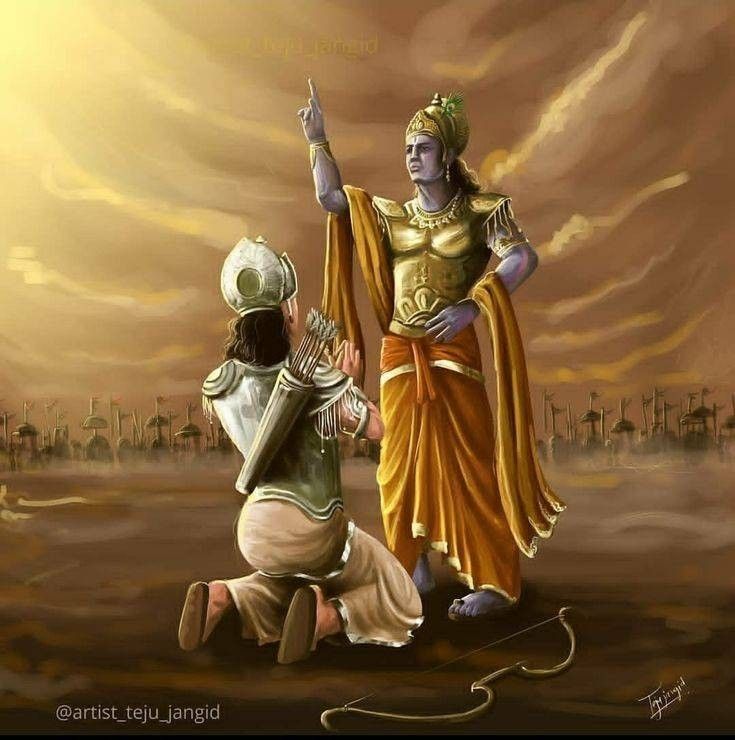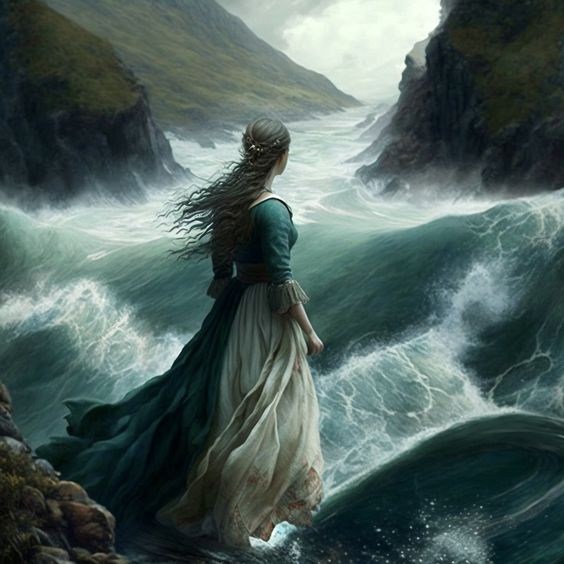OSHO, HAVE I TO PUSH THE RIVER?
First, even if you do, you will not be able to push it. For a moment you may feel powerful – that you are pushing the river – but finally you will be defeated by it. The river is huge, the energy is huge, it will take you. Finally, you will only feel defeated, frustrated.
That’s what people are doing and that’s why people look so frustrated and sad, so defeated, so depressed. They are pushing the river, fighting with life – not trusting life but fighting with life.
A very poisonous idea has entered into the human mind– that life is a struggle, that one has to fight, that it is a struggle to survive, that everybody is your enemy. Treat everybody as your enemy and beware. Everybody is going to destroy you. So before somebody else destroys you, it is better that you should jump on him.
Just the other day I was reading a new commandment: ‘Do to others before they do it to you.’ This is a poisonous idea, very irreligious.
Religion means trust, surrender, going with the river, going with God. We belong to this universe, we are not alien, nobody is your enemy. Even the enemy is not your enemy – that’s why Jesus says ’Love your enemies.’ He means that even the enemy is not your enemy, you must have misinterpreted him. In the final reckoning even your enemies are your friends. They were giving you challenges, they were creating situations for you to grow.
Don’t fight with life. If you fight, you will never win. Let me give you this paradox – and all great statements are paradoxical: If you want to win, don’t try to win; if you want to be defeated, try to win.
I was reading about Alexander the Great and about his last words. The last words that he uttered are tremendously significant. Remember them. The last words that he uttered do not look like Alexander’s, but he has come to an understanding – of course, very late. But even then, it is never too late. Even if you come home when the sun is setting, then, too, it is not too late.

The sun was setting, Alexander was dying. He was dying in his golden palace. He had the most beautiful palace that anybody has ever had before or since. He had all the power that a man can have and all the riches and all the beautiful women. He had all the greatest physicians of the world to take care of him and he was not very old, but he was dying.
And the physicians said, ’Now we are helpless. ’ He wanted to be alive at least twenty-four hours more, just twenty-four hours, because he wanted to see his mother. He had promised his mother that he would come back. He had to go and conquer the world, but when he was leaving he promised his mother that he would come back. And the distance was very little but at least twenty-four hours were needed to reach there, or for the mother to be brought to him. and he only wanted to live for twenty-four hours more – with all the wealth of the world and all the power of the world – but the physician said, ’It is impossible. You cannot live for even twenty-four minutes. Life is disappearing, slipping away. We are sorry but we cannot do anything.’
Lying on a golden couch studded with valuable diamonds, how helpless Alexander must have felt. He was just asking for twenty-four hours – not much. Not much at least for an Alexander. He was not a beggar. Twenty four hours for a man like Alexander was not too much but even that was not possible.
And when the last flicker of life was disappearing he opened his eyes, looked-at his gold palace, his generals standing around him, his immensely costly couch on which he was dying – a poor man, a beggar – and he laughed at the whole ridiculousness of it. And he wanted only twenty-four hours!
These were his last words. He said, ’All is vanity,’ closed his eyes and died. (Vanity: the emptiness, futility and worthlessness of human life)
’All is vanity.’ And he struggled his whole life for this vanity. He died a poor man, empty, exhausted, utterly disillusioned.
He was a conqueror. He was pushing the river of life according to his desires. He wanted to impose himself on existence.
Please, flow with the river. You are a part, you cannot impose yourself on the whole; the whole is infinite. It is as foolish as a small wave trying to direct the whole ocean, trying to dominate the whole ocean, trying to pull the ocean in a certain direction, to certain goals. It is not possible. How can a small wave be in control of the vast ocean? And we are not even waves, we are just ripples. For one moment we are there, another moment we are gone.
With this momentary life the only thing that you can learn is to surrender, to be in a let-go, not to push. Pushing, you will be moving in a wrong direction, the direction of the ego. Surrender. Fight, all fight, is out of the ego. Don’t even swim, just float with the river wherever it takes you.
Finally it takes you to the ocean. If a man is courageous enough to surrender, then God takes possession of him.
Then you are directed by infinite sources of understanding, love, energy. Then you are to decide on your own no longer. And when you are not to decide on your own, all anxiety disappears– obviously.
If your life is becoming insane just look deep down – you will find that all this deciding is driving you mad too. What to do? What not to do? Where to go? Where not to go? All is unknown and mysterious. And whatsoever you do, there is doubt about whether this is right or not. If you don’t do it there is doubt – maybe it was right. All this deciding…. If you want to push the river you will become insane.
Relax. Let God do it. Don’t be a doer. This is one of the most fundamental principles of Sufism– don’t be a doer, let God do it.
You need not push anything. You can just relax and let God do. You can become a vehicle; you can become an instrument– what in India we call nimitta. You can become instrumental.
That’s what Krishna goes on teaching to Arjuna in SRIMAD BHAGAVAD GITA. The whole teaching can be condensed into one thing, into one essential point – that you need not be a doer. Let God do it.

Krishna was not saying that you necessarily have to go into war, remember. That is a fallacy. Many people have thought that Krishna was forcing him to go into war. On the surface it looked like Arjuna was a pacifist and Krishna was a warmonger. It was not the case. Krishna was not saying anything about war in fact – and nobody knows whether this war ever happened. It may be just a parable… that is more of a possibility. It may be a metaphor.
But the message is immensely significant. The message is that you don’t decide, you don’t stand in the way, you disappear.
This is the life of a sannyasin. The life of a sannyasin is the life of one who has dropped deciding, who has relaxed, and who says, ’Let God do. I will function as an instrument. I will be a hollow bamboo. If he Wants to sing a song, he will make a flute of me; if he does not, I will remain a hollow bamboo. But I will be a hollow bamboo.’
You cannot sing any song on your own. All songs are His. And whenever you dance it is He who dances, and whenever you celebrate it is He that celebrates. Your life is not really yours, it is His life. All life is His.
So please, don’t push the river. Relax in the river. The river is already going to the ultimate goal. It will take you with it.
Osho: Sufis: The People of the Path, Vol 1: CHAPTER 12. THE ’INSTANT’ PATHOLOGY Q 2 (Excerpts)
“जब मैं था तब हरी नहीं, अब हरी है मैं नाहीं,
सब अंधियारा मिट गया, जब दीपक देखा माही।”………….संत कबीर
“Jab mein tha tab Hari nahi, ab Hari hai mein nahi,
Sab andhiyara mit gaya, jab deepak dekhya maahi.”………………Sant Kabir
When I was, God was not; now God is, and I am not.
All darkness vanished when I saw the divine light within.
A beautiful Sufi song that captures this sentiment is “Tu Mane Ya Na Mane, Dildara” by Wadali Brothers. This song expresses complete surrender to the divine, emphasizing that the presence of the beloved (God) is always there, regardless of whether one recognizes it. It resonates with the idea of becoming a hollow bamboo, allowing the divine to flow through and manifest as He wills.
Tu Mane Ya Na Mane,Wadali Brothers,Coke Studio @ MTV,S01,E03
Lyrics: by R P Deewana
Rab bande di zaat iko…
jive Kapde di zaat hai ruuhhh
kapde de wich uuh hai lukiya
kapde de wich ruh ruh lukiya
kite wich bande de tuu
aape bole aap bulanve…
aape bole aap bulanve
aape bole aap bulanve
aape kare hu hu…..
Tu mane ya na mane dildara
asan te tenu rab maniya
tu mane ya na mane dildara
asan te tenu rab maniya
{{das hor kera rab da dwara das hor kera rab da dwara
asan te tenu rab maniya
tu mane ya na mane dildara
asan te tenu rab maniya }} X 2
apne tan ki khaki udayi
tab ye ishq ki manzil payi
apne tan ki khaki udayi
tab ye ishq ki manzil payi
meri saanson ka bole ehi tara
asan te tenu rab manya
das hor kera rab da dwara das hor kera rab da dwara
asan te tenu rab maniya
tu mane ya na mane dildara
asan te tenu rab maniya
{{tujh bin jeena bhi kya jeena tere chaukhat mera medina}} X 3
kahi or na sajda gwara
asan te tenu rab manya
das hor kera rab da dwara das hor kera rab da dwara
asan te tenu rab maniya
tu mane ya na mane dildara
asan te tenu rab maniya
hasde hasde har ghum sehna
ha ha hasde ho.. hasde hasde har ghum hai sehna
raazi teri raza mein rehna
tune mujhko sikhaya hai yaara
asan te tenu rab maniya
tu mane ya na mane dildara
asan te tenu rab maniya
das hor kera rab da dwara das hor kera rab da dwara
asan te tenu rab maniya t
u mane ya na mane dildara {{asan te tenu rab maniya}} X 3


Written from the heart.
‘Surrender’ is the key takeaway for me.
Reminds me of the song, ‘Que Sera Sera. What will be, will be.’
Don’t force the river. Instead, try and clean the silt from its bottom, grow trees on the embankment so that others after you can continue to sustain.
Very well said. May be that is where Shri Krishan advises Arjun:
कर्मण्येवाधिकारस्ते मा फलेषु कदाचन।
मा कर्मफलहेतुर्भूर्मा ते सङ्गोऽस्त्वकर्मणि॥ २.४७
Idea of becoming a hollow bamboo and let the divine follow through is incredible.
A beautiful write up…
Surrender and letting go is what is missing in the current generation. We all are indefinitely struggling and fighting a never ending war.
The concept of not even swimming and rather floating is an ideal way to pursue a peaceful and meaningful life.